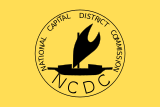Port Moresby
|
Port Moresby Pot Mosbi |
||
|---|---|---|

Downtown Port Moresby
|
||
|
||
| Location within Papua New Guinea | ||
| Coordinates: 9°30′49.1″S 147°13′7.7″E / 9.513639°S 147.218806°E | ||
| Country |
|
|
| Division | National Capital District | |
| Established | 1873 | |
| Government | ||
| • Governor | Powes Parkop (2007-) | |
| Area | ||
| • Total | 240 km2 (90 sq mi) | |
| Elevation | 35 m (115 ft) | |
| Population (2011 census) | ||
| • Total | 410,954 | |
| • Density | 1,700/km2 (4,400/sq mi) | |
| Languages | ||
| • Main languages | Motu, Tok Pisin, English | |
| Time zone | AEST (UTC+10) | |
| Postal code | 111 | |
| Website | www |
|
Port Moresby (/ˌpɔərt ˈmɔərzbi/; Tok Pisin: Pot Mosbi), also referred to as Moresby and Pom Town, is the capital and largest city of Papua New Guinea. It is located on the shores of the Gulf of Papua, on the south-eastern coast of the Papuan Peninsula of the island of New Guinea. The city emerged as a trade centre in the second half of the 19th century. During World War II it was a prime objective for conquest by the Imperial Japanese forces during 1942–43 as a staging point and air base to cut off Australia from Southeast Asia and the Americas.
In 2000 it had a population of 254,158. As of 2011[update] it had a population of 364,145, giving it an annual growth rate of 2.1% over a nine-year period. The place where the city was founded has been inhabited by the Motu-Koitabu people for centuries. The first European to see it was Captain John Moresby in 1873. It was named in honour of his father, Admiral Sir Fairfax Moresby.
...
Wikipedia


